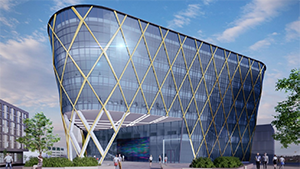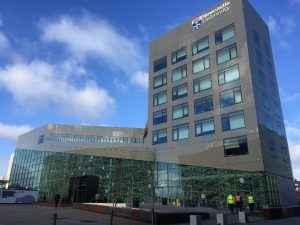Intelligent Campus vs Intelligent Estate
You may recall a previous blog on the topic of the Intelligent Campus following a Jisc Hackathon last summer (https://blog.bham.ac.uk/itnews/2018/09/05/making-the-campus-smarter-the-jisc-intelligent-campus-hackathon). The Intelligent Estate is the Estates Office take on this, looking at making data-driven decisions based on information we can collect from our university estate.

What do we mean by intelligent estate?
A number of buildings on our campuses already collect and generate a range of data types thanks to BMS (Building Management Systems), which monitor and control a range of environmental factors such as temperature, power usage and water consumption. With the growth in IoT (Internet of Things), Wi-Fi and sensor technologies, state-of-the-art buildings can now record a massive amount of data, including access records, occupancy, CO2 levels, power and water consumption, and pollution levels amongst others. The Intelligent Estate agenda aims to develop systems and processes that open up and use this data, allowing universities to use this important resource to drive business, teaching and learning improvements.
For example, with more data and a better understanding of when and how space is used, our university may be able to make smarter, more effective decisions. This might include:
- Saving energy, by not heating and cooling empty rooms
- Linking space utilisation data to the timetabling system, to ensure the activity being taught is given appropriate space
- Measuring temperature, air quality and CO2 levels to ensure teaching and learning spaces best support the activities taking place inside them
- Measuring occupancy and footfall in buildings to adjust planned maintenance schedules
- Providing occupancy, environment and footfall data to students enabling them to make choices about locations for study and group work
- Understanding dwell times across campus to better target student communications and marketing activities
The opportunities at Birmingham for utilising new smart and existing building technology to make a truly intelligent estate are vast.
IT and Estates visit the Newcastle Helix
Members of the IT Business Partnering and Innovation teams joined Estates colleagues to visit the Newcastle Helix, a flagship development of commercial and university space in Newcastle city centre. The reason for the visit was to explore the recent developments of Newcastle University’s campus, with a specific focus on the development of their “intelligent estate”. The trip involved meeting a number of estates and academic staff, followed by a tour of the brand new Urban Sciences Building and a discussion about the intelligent technology working behind the scenes.
The trip also provided an opportunity to discuss potential areas of focus of the intelligent estate for Birmingham, based on the inspiration provided by Newcastle.
Urban Sciences Building
Opened in September 2017 at Newcastle University, the £58million 12,500 sqm, Urban Sciences Building (USB) is a flagship development. The building and its surrounding city area is a living laboratory underpinning research to understand how intelligent buildings and cities impact the environment and their users.

The building contains 18,000 different sensors measuring everything from people movement, heat, CO2, air flow and even the performance of the buildings living roof. Several teams within the building are using this data to understand how the building is being utilised in order to make interventions that continuously improve the building over time.
What is the role of IT Services?
Realising the benefits of the intelligent estate approach at Birmingham, will require collaboration and support across a variety of professional services and academic colleges, including IT Services and Estates. An iterative approach will be required to identify opportunities and projects that realise the benefits of the intelligent campus initiative. IT Services have an important enabling role to play in this agenda, as we possess many of the skillsets and tools required to collect, manage and process large quantities of data.
With a number of flagship building developments on the horizon such as The Exchange and Molecular Science, there are several opportunities to begin testing some of these concepts. The IT innovation team is currently undertaking a series of prototypes that demonstrate aspects of the intelligent estate approach. This includes capturing and exploring datasets to model and understand building utilisation; these will help us understand what might be required from IT Services in the future.
Want to know more
If you want to know more about the intelligent estate initiative, please contact Sam Harrow or Tim Packwood.
References
- Why CO2 Levels in meetings, lecturers and campus matter to universities, people and productivity. – https://dash.harvard.edu/bitstream/handle/1/27662232/4892924.pdf?sequence=1
- Newcastle Helix – https://www.ncl.ac.uk/helix/
- JISC intelligent campus – https://www.jisc.ac.uk/rd/projects/intelligent-campus

1 thought on “The Intelligent Estate Initiative”